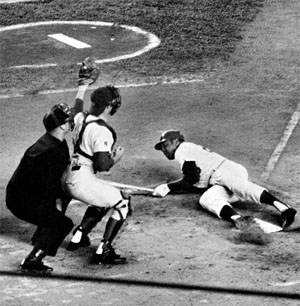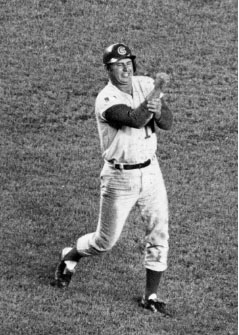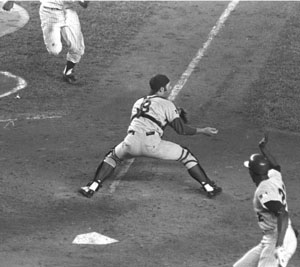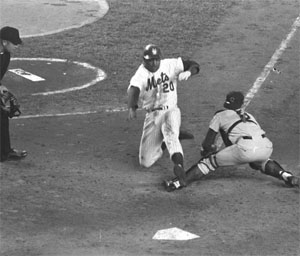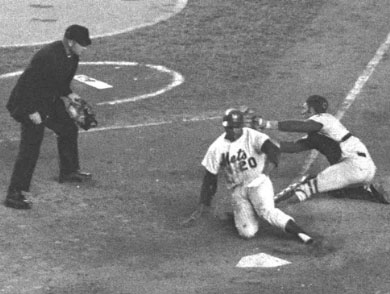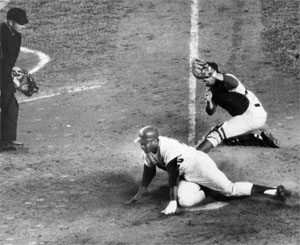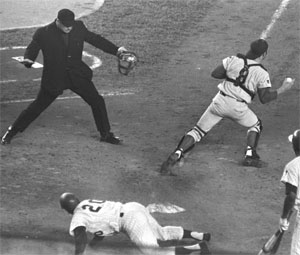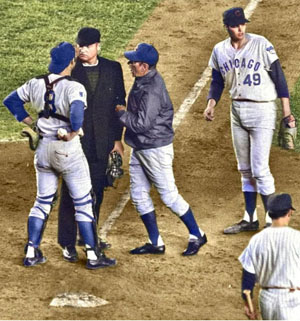September 8, 1969: Cubs @ Mets
The New York Mets and Chicago Cubs had been doormats for the other National League teams throughout the 1960s. The Mets had the better excuse since they were an expansion team that started in 1962. The Mets lost at least 109 games in each of their first four years.
But the Mets drafted young talent over the next few years. They were especially successful at finding and developing pitchers, including Tom Seaver, Jerry Koosman, and Nolan Ryan.
The best move the Mets front office made, though, was hiring Gil Hodges as manager for the 1968 season. Gil had been the Brooklyn Dodgers' first baseman during the 1950s when the Dodgers won three pennants and one World Series. After retiring as a player, Gil became manager of the two-year-old Washington Senators in 1963. The Senators improved their record each of the five years Hodges managed them, rising from tenth place when he took over the club to sixth place in 1967.
Mets General Manager Johnny Murphy wanted Hodges to become his manager so badly that he was willing to pay the Senators $100,000 and a player to be named later to get Washington to release him from the last year of his contract to take over the Mets for the 1968 season. Gil signed a three-year, $150,000 contract to manage the Mets.
The Mets had never finished above .500, but they were just four games below that mark at the 1968 All-Star break. However, they went 34-46 the rest of the way to fade to ninth place. Still, Mets fans had every reason to believe their heroes would continue to improve in 1969.
Mets RF Ron Swoboda wrote this in his 2019 memoir Here's the Catch about his feeling heading into the '69 season: "I didn’t feel any manifest destiny. We had pitchers for sure. Tom Seaver and Jerry Koosman had won 35 games between them in 1968, and when you threw Tug McGraw, Gary Gentry, Nolan Ryan, and Jim McAndrew into the mix, I’m not really sure anybody in Major League Baseball was as blessed as we were with as many good, young, hard throwers who could also pitch. ... The Mets’ problem was hitting. In a year when all hitting was down, we were nearly the bottom of the barrel; in 1968, we scored the second fewest runs in all of baseball."
The Cubs hadn't been pennant contenders since 1946, a year after they lost the World Series in seven games to the Detroit Tigers. From 1947 through 1960, they never finished above .500. During that time, the joke was that Philip Wrigley owned two things that people stepped on: chewing gum and the Cubs.
In desperation, Wrigley tried a system unprecedented in baseball history. Starting in 1961, the team would not have a single field manager. Instead, Wrigley selected a "college of coaches" consisting of eight veteran coaches in the Cubs organization. All eight rotated through the entire organization from the low minors all the way to the majors. Four different men held the top spot during the '61 season with another three fulfilling the manager's role during '62. The '61 Cubs actually showed a slight improvement over the previous year to finish seventh in the eight-team National League. But '62 produced the worst record in Cubs history: 59-103. Only the expansion Mets finished lower that year.
So Wrigley designated one "faculty member" of the "College of Coaches," Bob Kennedy, as the sole head coach for the next two seasons. The '63 Cubsfinished 82-80, their first winning record since 1946. But they sank back to 76-86 in '64 and then 76-86 in '65 under Lou Klein.
Wrigley surprised the baseball world again in 1966 by hiring 63-year-old Leo Durocher as his manager. "The Lip" immediately proclaimed, "I am not the coach. I am the manager. Only one man can run a ball club, and I'm it." He also declared, "This is no eighth-place team." He was right. The Cubs finished tenth in '66.
With a nucleus of young talent to complement veteran fan favorite Ernie Banks, including LF Billy Williams, 3B Ron Santo, SS Don Kessinger, and pitchers Ferguson Jenkins and Ken Hotzelman, the '67 Cubs improved by 28 games to 87-74, good for third place and a Manager of the Year award for Durocher. They finished third again in '68 (84-78).
The addition of the Montreal Expos and San Diego Padres to the National League, with the Kansas City Royals and Seattle Pilots joining the American League, caused each league to split into two divisions.
With the pieces in place for a pennant run in the East Division, the '69 Cubswon 11 of their first 14 games and stayed in first place from opening day into August. Their biggest lead was nine games on June 15 when their record was 40-19.
Meanwhile, the Mets started slowly. They finally climbed above .500 on June 3 (24-23). That put them in second place, 8.5 games behind the Cubs. As expected, Tom Seaver was the ace of the staff, compiling a record of 20-7 by September 8.
The Mets-Cubs' first three series of the season couldn't have been closer: seven wins each.
Chicago Daily News writer John P. Carmichael pointed out: "This is a strange year. Both the Cubs and Mets are Cinderella teams in the same year. It's tough to choose between them for the sentimental, non-partisan fans. On one side is the bold, brash, not-too-likeable Leo Durocher, but a fine manager. On the other is Hodges, a low-key pilot who exudes warmth and camaraderies, even among his players. In his own way, Gil is a Stengel, but in no parallel sense of eloquence."
When Durocher's club came to New York for a crucial two-game series September 8-9, the Cubs led the second-place Mets by only 2.5 games after leading by nine August 16. Writers criticized Durocher for not giving his players enough rest during the hot summer months to keep them fresh for the home stretch and using outdated tactics to motivate his club. Bob Billings of the Chicago Daily News wrote: "Durocher's use of old-time, hard-line psychology on his players–chewing-outs, and virtual ostracisms don't have the same effect on young ballplayers they did 15 to 20 years ago."
Hodges had his two best pitchers ready: southpaw Jerry Koosman for Monday night and Tom Seaver for Tuesday night. Durocher would counter will his ace, Bill Hands (16-12), followed by Ferguson Jenkins.
Koosman was excited about his start. "A pitcher usually gets to look forward to one big game a year. And this is it for me."
Mets first-base coach Yogi Berra commented on his team's pennant race performance. "For so many young players, this team is handling (it) real well. And still being in the race for the pennant at this of the year sure makes the season go a lot faster."
The Mets would be without hard-hitting LF Cleon Jones, who was second in the National League with an average of .348. An injury to his right hand had benched him for several days.
Mets CF Tommie Agee expressed confidence. "We're ready for the Cubs. We don't have to be afraid of anybody because we've got the pitching and the clutch batting. There really isn't a weak man in our lineup."
Cubs 3B Ron Santo had this comment about the crucial series. "We're going to find out how good we are." LF Billy Williams pointed out, "We're still on top after all, and we are going to turn ourselves around. We're a road club lately, but we're the ones ahead. They have to catch us."
The Cubs would be satisfied with a split of the two games, which would leave their 2.5-game lead intact. However, the Mets needed a sweep, which would put them only 1/2 game behind. |
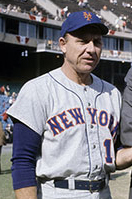
Gil Hodges
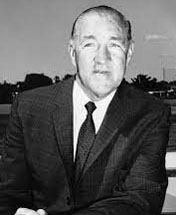
Johnny Murphy
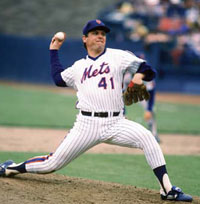
Tom Seaver
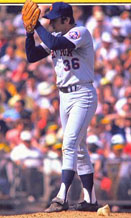
Jerry Koosman
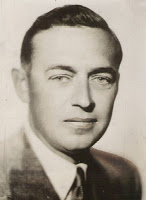
Philip Wrigley
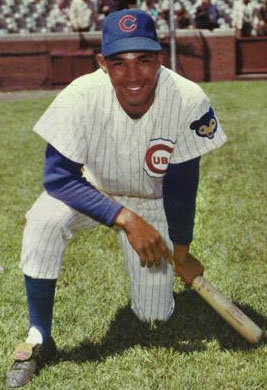
Billy Williams
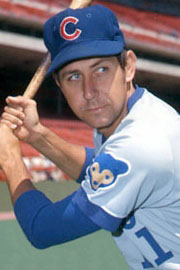
Don Kessinger
|
Starting Lineups
Batting Averages at game time
Chicago Cubs
| Don Kessinger |
SS |
.287 |
| Glenn Beckert |
2B |
.304 |
| Billy Williams |
LF |
.299 |
| Ron Santo |
3B |
.292 |
| Ernie Banks |
1B |
.252 |
| Jim Hickman |
RF |
.230 |
| Randy Hundley |
C |
.270 |
| Don Young |
CF |
.233 |
| Bill Hands |
P |
16-12 |
|
 |
 |
New York Mets
| Tommie Agee |
CF |
.283 |
| Wayne Garrett |
3B |
.223 |
| Donn Clendenon |
1B |
.257 |
| Art Shamsky |
LF |
.300 |
| Ken Boswell |
2B |
.262 |
| Ron Swoboda |
RF |
.240 |
| Jerry Grote |
C |
.244 |
| Bud Harrelson |
SS |
.238 |
| Jerry Koosman |
P |
12-9 |
|
|
First Inning
- Before a full house of 43,274 and a light rain during the first three innings, Jerry Koosman started strong, getting Don Kessinger on a flyball and striking out Glenn Beckert and Billy Williams.
- Presumably on orders from Durocher and recalling that Tommie Agee had led off with a homer against him at Shea Stadium July 10, Bill Hands decked Tommie Agee with a high hard one on his first pitch. Tom Seaver stood on the top step of the Mets dugout and yelled, "You don't want to play that game." Agee then grounded out–the last time all night the Cubs would get him out, Wayne Garrett flied out, and Donn Clendenon fanned.
Second Inning
- Koosman retaliated by firing a fastball inside to Ron Santo, hitting him a few inches above the right wrist. The 26-year-old lefty then struck out the side, Ernie Banks, Jim Hickman, and Randy Hundley.
- The Mets went down 1-2-3. Art Shamsky popped to short, Ken Boswell flew to center, and Ron Swoboda took a called third strike.
Third Inning
- After Don Young and Hands grounded out, Kessinger got the first hit of the evening, a single. But Beckert bounced out to end the inning.
- Jerry Grote grounded out before #8 hitter Bud Harrelson beat out a high bounder to short. Koosman popped out. That brought up Agee, who got his own revenge by slamming his 26th home run of the season to left field to put the Mets in front. Garrett flied out to end the inning. Mets 2 Cubs 0
Fourth Inning
- Following Williams' popout and Santo's fly out, Koosman walked Banks. But Hickman forced Ernie at second to end the inning.
- The inning started promisingly for the Mets when Clendenon reached first on Kessinger's error, and Shamsky singled to put runners on first and second. But Boswell grounded into a 4-6-3 double play, and Swoboda bounced out.
Fifth Inning
- Koosman raised his strikeout total to seven by fanning Hundley and Young. Then Jerry's opposing moundsman at least put the ball in play, grounding out to third.
- Hands made quick work of the 7-8-9 batters in the Mets order, retiring Grote (5-3), Harrelson (fly to center), and Koosman (pop to first).
Sixth Inning
- The top of the Cubs order, facing Koosman for the third time, started a rally that tied the game. Three straight singles by Kessinger, Beckert, and Williams plated one run, and Santo's long sacrifice fly to left knocked in the tying tally. After Banks flew out, Williams advanced to second on a wild pitch. Following Hickman's walk, Hundley gave the crowd a few anxious moments when he blooped a fly into right field. It looked like 2B Boswell and RF Swoboda were on a collisoin course until Ken finally swerved away from Ron, who lumbered in to catch the ball at his knees to keep the score tied. Mets 2 Cubs 2
- The Mets quickly retook the lead. Agee led off with a hit past Santo that he hustled into a double with a headlong slide. "I knew Williams would have a long way to go on that wet outfield, and I made up my mind to go for two right away," Tommie said. When Garrett lashed a singled just to the right of 2B Beckert, Tommie hesitated at second a moment to make sure the ball went through. Then he took off, roared around third, and headed home. "I had to send him home," said third base coach Eddie Yost. "He's our best runner, isn't he? It was worth the gamble." Hickman made a strong throw to the plate. It looked like a certain out, but Agee slid past Hundley, who came up the third base line a few feet and straddled it as he took the throw on two bounces. To the astonishment of many, including Hundley, rookie home plate umpire Dave Davidson called Agee safe. "I knew it would be close because of the hesitation," said Agee. "I tried to go across Hundley's legs, and I skinned my right leg against his shinguard. I didn't even look back. I was sure he didn't touch me." Thinking he had tagged Agee, Hundley couldn't believe the call. "I heard the mob roar, and I looked back and saw Davidson calling him safe. I couldn't believe it. I still can't. He almost knocked the ball out of my mitt." Hundley jumped up and down and, joined by Durocher, accosted Davidson.
When play resumed, Clendenon flied to center, and Shamsky walked. But Hands avoided further
damage by getting Boswell to hit into a 6-3 double play.
Mets 3 Cubs 2
Seventh Inning
- Pitching with a lead again, Koosman struck out Young. Hands hit for himself and also whiffed. Kessinger grounded out 5-3.
- Still sharp, Hands struck out Swoboda and Harrelson with a Grote popout in between.
Eighth Inning
- In an era when managers didn't use a closer to preserve a lead, Hodges stayed with Koosman. Even after Beckert singled and Williams beat out an infield hit, Gil made no move. Santo, determined to make Koosman pay for hitting him, drilled a wicked shot between Harrelson and second base. The slick-fielding shortstop gloved the ball and started a smart 6-4-3 double play. With the tying run on third, Koosman struck out Banks.
- Leading off, Koosman immediately hit the dirt to avoid a high hard one from Hands. Then Jerry struck out. Agee drew a walk, but Garrett forced him at second as Tommie threw a rolling block into Kessinger to keep him from completing the double play. But Clendenon hit back to the mound to keep the lead at a slim one run.
Ninth Inning
- Hodges made two defensive changes. Al Weis replaced Ken Boswell at second base, and Rod Gaspar replaced Shamsky in left field.
With "the Shea cauldron boiling almost beyond control," Koosman struck out Hickman, but Hundley, still boiling mad about the call at home in the sixth, singled to center. Inexplicably, Durocher sent up rookie Ken Rudolph to pinch hit for Young. Koosman struck him out. Then Leo called on another rookie, Randy Bobb, to bat for Hands. Koosman made him his 13th strikeout victim.
FINAL SCORE: METS 3 CUBS 2
|
|
Postgame
Mets Clubhouse
- "Nobody had to psyche me up for this one," said Koosman. I haven't been the pitcher I ought to be this year. We had pictures taken, and they showed I wa turning my head too much and rushing my delivery, bringing my body past my arm too soon. I really was aware of what I wanted to do differently tonight." Asked if his pitch that hit Santo to start the second inning was intentional, Jerry said, "At first, I thought Hands' first pitch to Tommie was a slider that slipped away. That can happen. Then Tommie himself told me it was a fastball. That makes a diffference. I wouldn't deliberately throw at a batter. None of the pitchers around here do. What I did was try to let him know we knew what they were trying to do, and that they wouldn't get away with it. I hate to think Santo was hurt bad, because what really happened was he stepped into a pitch that tailed into him. He threw up his hand, and the ball got him. If it made their pitcher think twice before knocking down any of our guys again, then I'm glad."
- Asked if he thought Hands intentionally threw at Agee in the first inning, Hodges said, "No, no. I don't get involved in such things anymore because what can I do about it? Now when I was a player, I might have thought different. I know I would expect my pitcher to protect his teammate just like our fellow did tonight. Jerry handled things just right."
- Asked about the pitch at his head, Agee said, "It woke me up. ... It helped my concentration." He also commented on the controversial play at the plate in the sixth inning. "He (Hundley) wanted me to be out so bad. He thought he tagged me. I felt I was safe all the way. I was surprised he argued. He didn't even touch me." Video of the play confirmed Agee's story. On the Mets radio broadcast, Bob Murphy told his audience that the replay showed that Hundley never tagged Agee, and Davidson later confirmed that was why he signaled safe.
- John Carmichael quoted a "veteran" Met player who said, "The Cubs should be 10 games in front. They've got as fine a double play combination as you can want. They've got a Banks, a Santo, and an indestructable Billy Williams. We are playing without our best hitter, Cleon Jones. There's no comparison between the two clubs."
Cubs Clubhouse
- As he had been doing for weeks, Durocher refused to talk to the press. "I never say a word after a ball game, win or lose." Perhaps Leo knew the scribes would grill him on why he sent up two rookie pinch hitters in the ninth with the game on the line when he had rookie hotshot Oscar Gamble and veterans Willie Smith and Al Spangler available.
- Owner Wrigley was asked for his thoughts on why Durocher used the rookies. "You'll have to ask Leo, and I don't think you'll find him in a good mood if you find him." Still, Wrigley remained optimistic about his faltering team, which still led the Mets by a game and a half. "They certainly should win. They have the ability and the will to win. If they get synchronized again, they'll win."
- Hundley refused to admit he missed the tag on Agee. "I was about 10' up the line when I made the tag and turned to make sure the runner (Wayne Garrett) wasn't going to tak an extra base and was ready to throw the ball back to the pitcher. All of a sudden I heard this roar. I turned around and the umpire said he was safe or had his hands spread out or something. I don't know what he said or did. I was too frustrated when I found out he called Agee safe. I just couldn't believe it. I still can't believe it. I want to see pictures." Told that TV reruns indicated he had missed Agee, Hundley replied, "Those were New York TV pictures. I want to see some other pictures. Don't you think, if I thought I'd missed him, I would've turned around and gone after him again. He jarred the ball out of the pocket, and it stuck in the end of the webbing. That call changes the whole situation of the ball game."
- Santo's wrist was swollen and stiff. He would need X-rays the next day to determine if there was a fracture. His participation in the second game of the series was doubtful.
- Williams complained about the outfield grass, which slowed Agee's hit in the sixth and allowed him to stretch a single into a double. "It's the highest in the league. Don't they cut it here? I have to play back on a power hitter like Agee. I play close, and he'll put one over my head. By the time I got to the ball, he was going into second. If that grass hadn't been high, it would have been a single."
Postscript
- The Mets won again the next night behind Seaver 7-1.
- They continued their torrid pace the rest of the month and won the pennant by eight games over the second-place Cubs, who finished September with only eight victories in 25 games.
- The Amazin' Mets defeated the Atlanta Braves in the first National League Division Series, then shocked the baseball world even more by upending the Baltimore Orioles in the World Series in six games.
References: Mr. Cub, Ernie Banks and Jim Enright (1971)
Nice Guys Finish Last, Leo Durocher with Ed Linn (1975)
The Sporting News Selects Baseball's 25 Greatest Pennant Races by Lowell Reidenbagh (1987)
The Lip: A Biography of Leo Durocher, Gerald Eskenazi (1993)
Gil Hodges, SABR Biography Project, sabr.org, John Saccoman
Here's the Catch: A Memoir of the Miracle Mets and More, Ron Swoboda (2019)
|
|









